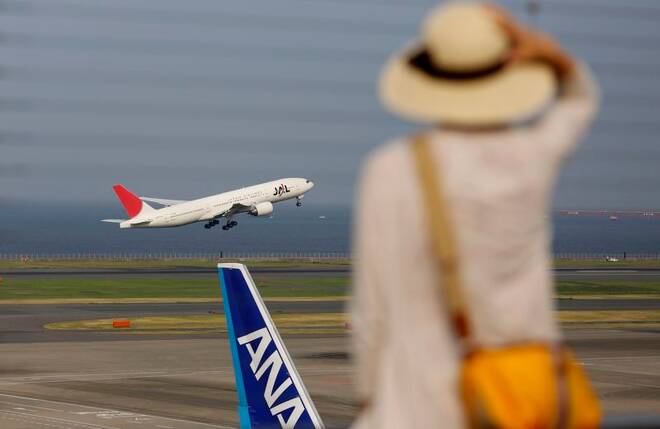Advertisement
Advertisement
Corporate travel propels boom in sustainable aviation fuel
By:
By Jamie Freed SYDNEY (Reuters) - A growing number of companies are making bulk purchases of sustainable aviation fuel (SAF) to reduce their carbon footprints, encouraging mass production of the cleaner energy that airlines need to meet their emissions targets.
By Jamie Freed
SYDNEY (Reuters) -A growing number of companies are making bulk purchases of sustainable aviation fuel (SAF) to reduce their carbon footprints, encouraging mass production of the cleaner energy that airlines need to meet their emissions targets.
Airlines, travel agents and fuel producers are now offering corporate customers the opportunity to buy SAF not linked to individual flights, as companies go beyond cheaper carbon offset options like planting trees to reduce the environmental burden of flying.
The industry move toward a “book and claim” accounting system like that used in the renewable electricity sector allows for greater flexibility given the relative scarcity of SAF, which uses feedstocks like cooking oils to reduce emissions by up to 80% from conventional fuel but is available only at limited airports globally.
In a recent deal announced by Qantas Airways, five companies will pay a premium to reduce their emissions by contributing to the cost of the airline using SAF supplied by BP at London’s Heathrow Airport.
The companies involved can claim an emissions reduction to be used for a variety of potential purposes that is not linked to their business travel from London to Australia.
Participant Boston Consulting Group (BCG), which is also buying SAF through United Airlines and fuel suppliers SkyNRG and Neste, said it was looking to help scale the SAF market to meet internal targets.
“Our largest source of emissions come from business travel, and there we have committed to cut our emissions intensity in half by 2025, compared to 2018,” BCG Chief Sustainability Officer David Webb said.
Australia Post, another Qantas partner, said it would use the credits to reduce its emissions from air freight at a time when SAF is not available in Australia.
Qantas said the more companies that join the programme, the more feasible and cost effective a local SAF industry would become.
A growing number of carriers, including United, Lufthansa, Cathay Pacific Airways, Air France KLM and Japan’s ANA Holdings, have similar programmes.
SAF accounted for only 0.5% of aviation fuel in 2021, but many airlines have a target of 10% by 2030 and the industry’s goal of “net zero” emissions by 2050 relies on SAF accounting for 65% of fuel.
The corporate sector interest could build momentum for the SAF industry to scale up given businesses account for around 20% of air travel globally and 30% in Europe, said Denise Auclair, corporate travel campaign manager at European non-governmental organisation Transport & Environment.
Only a limited number of airlines like Finnair and Scandinavia’s SAS allow individual customers such as leisure travellers to pay for SAF to reduce flight emissions.
‘GREEN PREMIUM’
Buying SAF is more costly than purchasing emissions offsets but experts say it can play a key role in reducing travel emissions alongside switches to video-conferencing and cleaner alternatives like rail.
Companies are paying a “green premium” when they purchase SAF given it costs around three to five times more than conventional jet fuel, said Sami Jauhiainen, vice president APAC at Neste’s renewable aviation business, the world’s largest, which offers a corporate buying programme.
“They contract with us, they pay for the cost premium of sustainable aviation fuel over the conventional jet fuel, and then enable us to deliver sustainable aviation fuel for our partner airlines to consume,” he said. “And then we can support the end customer with relevant reporting and documentation that they need to recognise the benefits.”
Companies are able to contract directly with airlines, travel agencies like American Express Global Business Travel (Amex GBT) and fuel providers like Neste as they look to claim SAF credits and avoid pitfalls like double claiming.
Double claiming issues will become increasingly acute as more countries mandate a certain percentage of SAF blended in all aviation fuel, according to a World Economic Forum (WEF) white paper on SAF accounting and reporting guidelines released in October. France already has a 1% requirement, while the European Union will mandate 2% from 2025.
Amex GBT worked with Shell and Accenture to create a block chain-based platform to ensure that certificates purchased by corporate customers are non-fungible in the biggest pilot of book and claim to date.
“This platform allows you to buy SAF and use any airline you’d like,” Amex GBT Chief Commercial Officer Drew Crawley said.
(Reporting by Jamie Freed; Editing by Stephen Coates)
About the Author
Reuterscontributor
Reuters, the news and media division of Thomson Reuters, is the world’s largest international multimedia news provider reaching more than one billion people every day. Reuters provides trusted business, financial, national, and international news to professionals via Thomson Reuters desktops, the world's media organizations, and directly to consumers at Reuters.com and via Reuters TV. Learn more about Thomson Reuters products:
Advertisement
